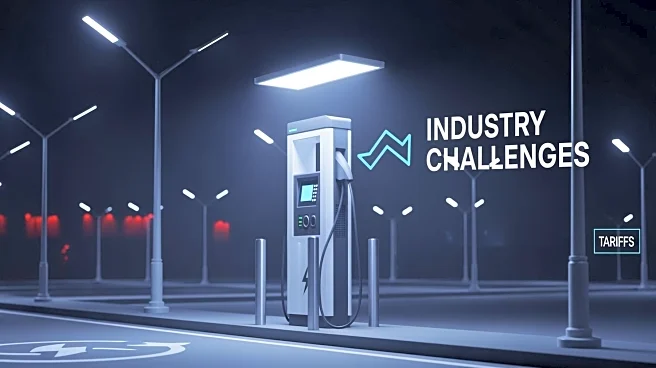What's Happening?
General Motors has reported a significant decline in its third-quarter profit, largely attributed to tariffs and costs associated with electric vehicles. The company's net income fell to $1.3 billion,
a sharp decrease from $3 billion in the previous year. Despite this downturn, investors were encouraged by General Motors' revised forecasts for profit and cash flow, alongside a reduced tariff impact. The automaker has adjusted its earnings forecast for 2025, lowering the expected tariff bill to between $3.5 billion and $4.5 billion, down from an earlier estimate of $4 billion to $5 billion. This adjustment comes as the company plans to increase production in the United States, particularly for internal-combustion trucks, while scaling back its electric vehicle strategy.
Why It's Important?
The developments at General Motors highlight the broader impact of trade policies and economic shifts on the automotive industry. The reduction in tariff costs and the strategic pivot towards internal-combustion vehicles reflect the company's adaptation to changing market conditions and regulatory environments. This move could influence other automakers facing similar challenges, potentially affecting the industry's approach to electric vehicle production and international trade. Investors and stakeholders in the automotive sector are closely monitoring these changes, as they could have significant implications for future profitability and market dynamics.
What's Next?
General Motors' decision to adjust its production strategy and profit forecasts may prompt reactions from industry competitors and policymakers. The company's focus on internal-combustion trucks could lead to increased competition in this segment, while its reduced emphasis on electric vehicles might impact its long-term sustainability goals. Stakeholders will be watching for further policy changes from the administration that could affect tariff costs and subsidies, as well as potential shifts in consumer demand for electric vehicles.
Beyond the Headlines
The strategic decisions by General Motors underscore the complex interplay between trade policies, environmental goals, and economic realities. As the company navigates these challenges, it raises questions about the future of electric vehicles and the role of government incentives in shaping industry trends. The balance between profitability and sustainability remains a critical issue for automakers, with potential long-term implications for environmental policy and consumer behavior.











